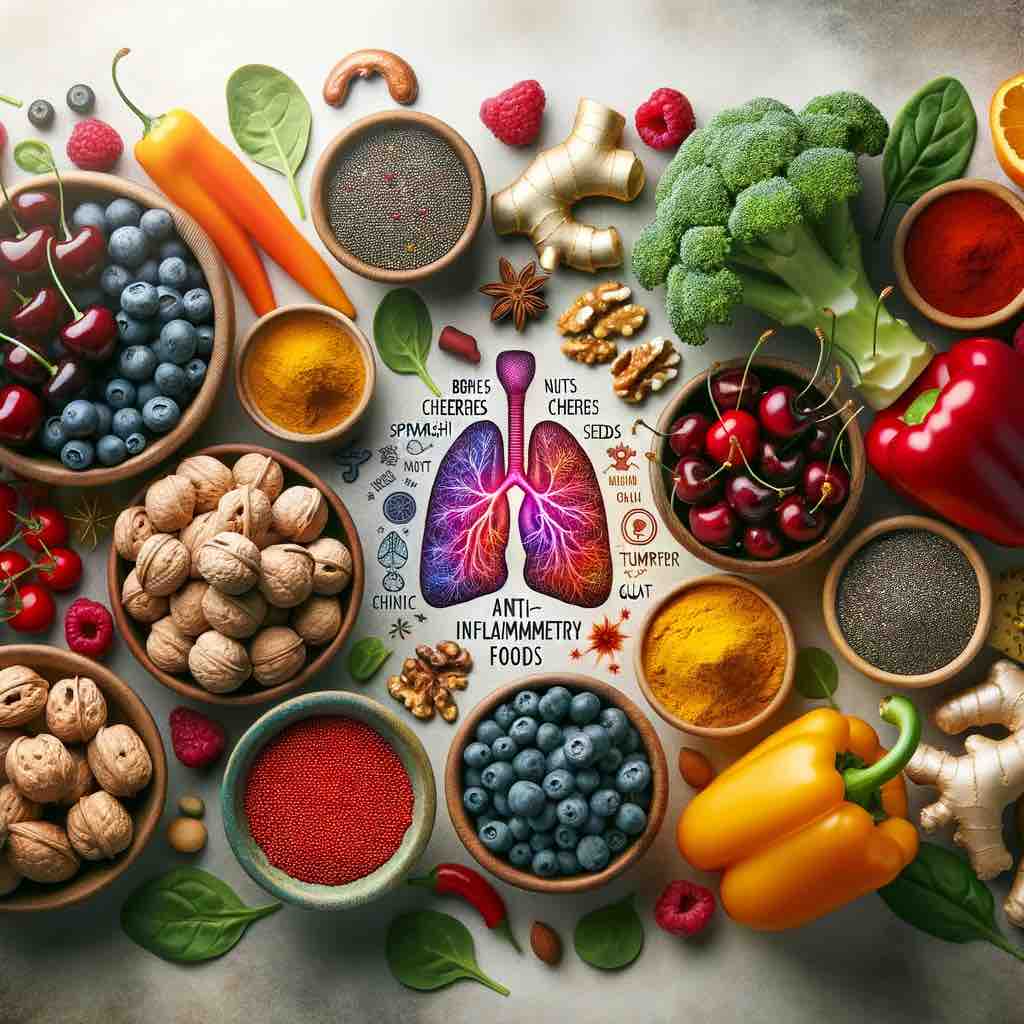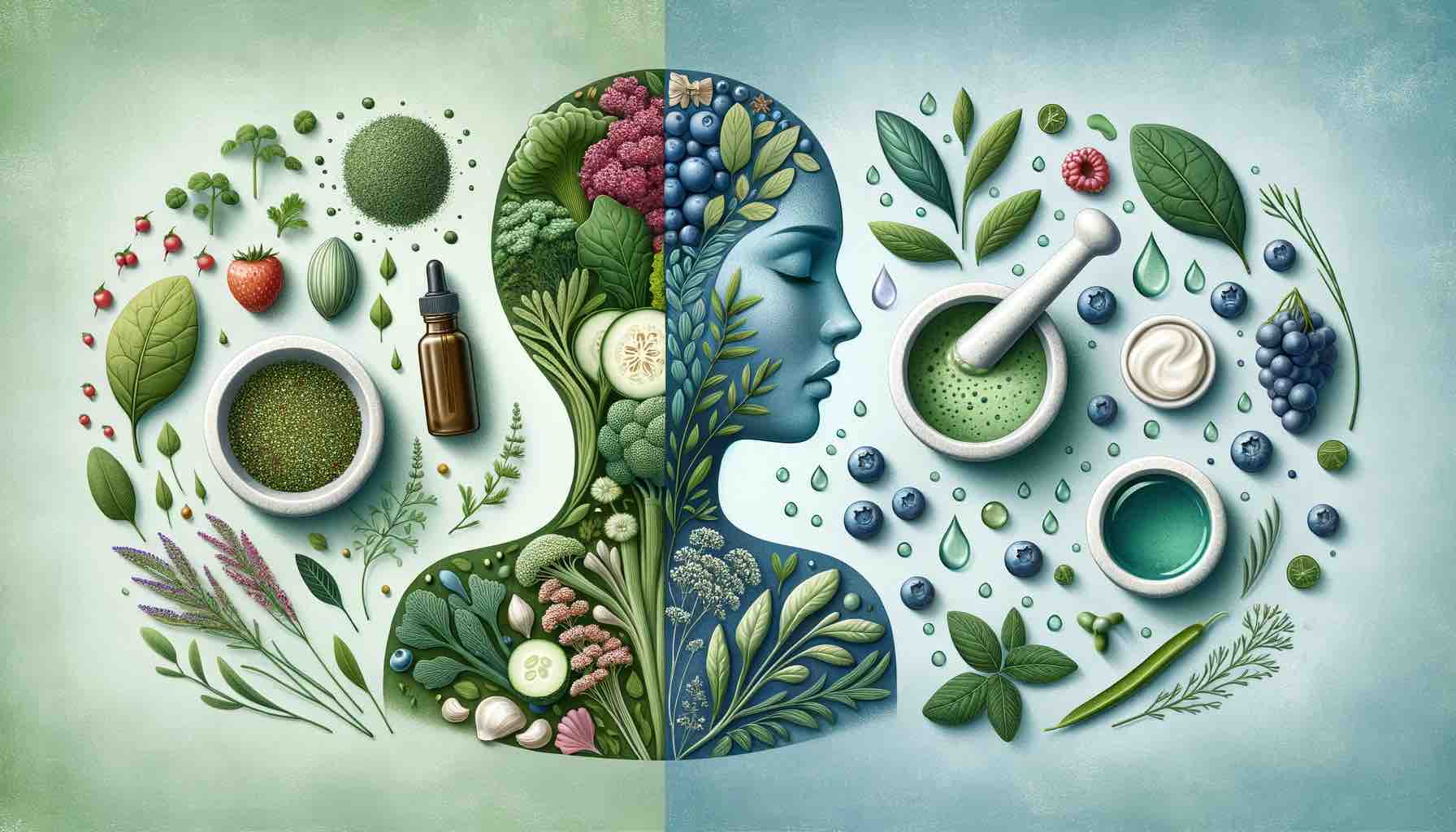
Embarking on a dietary journey enriches the canvas of our nutritional intake with diverse foods that aim to tackle inflammation and bolster well-being. Whether you are navigating the complexities of conditions such as Rheumatoid Arthritis, Inflammatory Bowel Disease (IBD), or Ulcerative Colitis (UC), each morsel consumed plays a pivotal role in shaping health outcomes. Let’s unearth the nutritional treasures that are quintessential in combatting inflammation and nurturing health.
I. Fruits: A Symphony of Sweet, Anti-Inflammatory Riches
Berries: The Antioxidant Powerhouses
- Role: Berries, with their antioxidant abundance, play a crucial role in curbing inflammation and bolstering immune health.
- Consumption Tips: Incorporate into smoothies, yogurts, or enjoy as fresh snacks.
Cherries: Nature’s Sweet Anti-Inflammatory Gems
- Role: Cherries are laden with anthocyanins, instrumental in managing inflammation and arthritis symptoms.
- Consumption Tips: Relish them fresh, in juices, or infused within delightful desserts.
II. Vegetables: The Green Brigade Against Inflammation
Leafy Greens: Vitamin-Rich Shields
- Role: Leafy greens, like spinach, are fortified with essential vitamins and antioxidants, playing a cardinal role in an anti-inflammatory diet.
- Consumption Tips: Embrace them in salads, smoothies, or as nourishing sides.
Broccoli: The Cruciferous Guardian
- Role: Broccoli, a powerhouse of antioxidants, supports heart health and acts as a guardian against inflammation.
- Consumption Tips: Savor it steamed, roasted, or blended within various dishes.
III. Proteins: The Pillars of Strength and Resilience
Fatty Fish: The Omega-3 Sentinels
- Role: Varieties like salmon are replete with omega-3 fatty acids, playing a paramount role in mitigating inflammation and nurturing heart health.
- Consumption Tips: Explore culinary creativity with baking, grilling, or incorporating into salads and soups.
Nuts and Seeds: The Unsung Heroes
- Role: With a symphony of healthy fats and nutrients, nuts and seeds emerge as unsung heroes in the anti-inflammatory odyssey.
- Consumption Tips: Revel in their versatility by adding them to various dishes or enjoying them as hearty snacks.
By embarking on this part of the journey, you unlock the doors to a realm where each food, with its unique qualities, acts as a custodian of your well-being, paving the path toward a life enriched with vitality and wellness. Stay tuned as we unveil more chapters of this enriching nutritional saga in subsequent sections.
IV. Grains & Legumes: The Foundation of a Balanced Anti-Inflammatory Diet
Quinoa: The Versatile Superfood
- Role: An incredible source of protein and fiber, quinoa also brings a wealth of anti-inflammatory benefits, promoting gut health.
- Consumption Tips: Use it as a base for salads, incorporate into soups, or enjoy as a wholesome side dish.
Lentils: The Nutrient-Packed Staples
- Role: Lentils are a fantastic source of protein and essential nutrients that contribute to an anti-inflammatory lifestyle.
- Consumption Tips: Create hearty soups, stews, or blend into plant-based patties.
V. Oils & Fats: The Essence of Healthy Culinary Creations
Olive Oil: The Heart-Healthy Elixir
- Role: Extra virgin olive oil, rich in monounsaturated fats, plays a vital role in reducing inflammation and promoting heart health.
- Consumption Tips: Drizzle over salads, use in cooking, or as a base for homemade dressings.
Avocado: The Creamy, Nutrient-Rich Delight
- Role: Avocados are not only delicious but also packed with healthy fats and anti-inflammatory properties.
- Consumption Tips: Enjoy in salads, smoothies, or as a rich, creamy spread.
VI. Beverages: Hydration with a Healing Touch
Green Tea: The Antioxidant Brew
- Role: Known for its antioxidant properties, green tea is a wonderful beverage to support anti-inflammatory efforts.
- Consumption Tips: Sip it warm, enjoy as a cold brew, or even use it as a base in smoothies or other drinks.
Turmeric Latte: The Golden Healing Drink
- Role: Combining the powerful anti-inflammatory benefits of turmeric, this latte is a warm, healing beverage.
- Consumption Tips: Enjoy it warm as a comforting drink, perfect for any time of the day.
These segments of your diet paint a canvas of possibilities, each contributing uniquely towards fighting inflammation and creating a tapestry of wholesome, nourishing foods that support your journey towards better health and well-being. Embrace each category, exploring the versatility and benefits they bring, as we continue unraveling more nutritional treasures in the upcoming segments.
VII. Herbs & Spices: Nature’s Potent Flavor Enhancers
Turmeric: The Golden Spice
- Role: A powerhouse of anti-inflammatory compounds, notably curcumin, turmeric is a staple in managing inflammatory conditions.
- Consumption Tips: Incorporate into soups, stews, or as a warm, comforting turmeric latte.
Ginger: The Zesty Revitalizer
- Role: With its warming properties, ginger emerges as a strong ally against inflammation and digestive issues.
- Consumption Tips: Utilize in teas, smoothies, or as a flavorful addition to various dishes.
VIII. Fermented Foods: Guardians of Gut Health
Yogurt: The Probiotic Marvel
- Role: As a reservoir of probiotics, yogurt stands as a guardian of gut health, an essential aspect of managing inflammation.
- Consumption Tips: Enjoy it plain, in smoothies, or as a base for dressings and sauces.
Kefir: The Fermented Elixir
- Role: Kefir, a fermented delight, enriches the gut flora, steering the journey towards reduced inflammation.
- Consumption Tips: Savor it as a drink, within smoothies, or as a versatile culinary ingredient.
IX. Sweets & Treats: Indulgence with a Nutritional Touch
Dark Chocolate: The Antioxidant-Rich Indulgence
- Role: With a cacophony of antioxidants, dark chocolate emerges as a sweet ally in the anti-inflammatory regiment.
- Consumption Tips: Relish in moderation, choosing varieties rich in cocoa content.
Honey: Nature’s Sweet Healer
- Role: In its natural form, honey unfolds as a sweet reservoir of anti-inflammatory properties.
- Consumption Tips: Utilize as a natural sweetener in beverages, desserts, or as a soothing ingredient in warm drinks.
Navigating through this diverse realm of herbs, spices, and delightful treats, each element carries the essence of healing, contributing uniquely towards managing inflammation and nurturing wellness. Explore the symphony of flavors and healing potentials they bring, as we continue to unveil more dimensions of the anti-inflammatory dietary landscape in the subsequent segment.
X. Nuts & Seeds: Tiny Titans of Nutrients
Almonds: The Heart-Healthy Nut
- Role: Packed with vitamin E and antioxidants, almonds make a strong contribution to the anti-inflammatory diet.
- Consumption Tips: Enjoy as a snack, in baked goods, or as almond butter spread.
Chia Seeds: The Omega-3 Rich Seeds
- Role: Chia seeds are a rich source of omega-3 fatty acids and fiber, promoting overall gut health and reducing inflammation.
- Consumption Tips: Incorporate into smoothies, oatmeal, or use as an egg substitute in baking.
XI. Special Diets: Tailoring Nutrition to Specific Needs
Gluten-Free and Anti-Inflammatory
- Role: For those with sensitivities or intolerances, a gluten-free approach can be a pillar in managing inflammation.
- Consumption Tips: Explore a variety of gluten-free grains, legumes, and other food sources.
Vegan/Vegetarian Anti-Inflammatory Options
- Role: A plant-focused diet offers a bounty of anti-inflammatory benefits, from diverse vegetables, legumes, nuts, and seeds.
- Consumption Tips: Build meals around a colorful array of plant-based foods, ensuring a symphony of nutrients and benefits.
XII. Closing Thoughts: Crafting Your Anti-Inflammatory Journey
Crafting an anti-inflammatory diet is a journey of exploration, diversity, and personalization. Dive into the wealth of options, from the bounties of fresh produce, hearty grains and legumes, to the rich world of healthy fats, nuts, and seeds. Tailor these treasures according to your unique needs, whether steering towards gluten-free paths, or embracing the plant-based realms of vegan or vegetarian diets.
The canvas of anti-inflammatory nutrition is rich and vibrant, allowing for creativity and adaptation to flourish in your wellness journey. Embrace the symphony of flavors, nutrients, and healing potentials, cultivating a diet that resonates with your body’s needs, nurturing a harmony of health, well-being, and joyful eating.
Call to Action (CTA)
🌿 Join Our Community of Healing and Transformation! 🌿
Embark on a remarkable journey filled with healing, wellness, and transformation through the powerful world of anti-inflammatory foods! We invite you to dive deeply, explore, and implement these dietary treasures into your daily life. But the journey doesn’t end here – we want to hear from YOU!
🌟 Share your experiences: What changes have you noticed since embracing an anti-inflammatory diet? Which foods have become your allies in this journey?
🗣 Engage in meaningful conversations: Drop a comment and connect with others who are on a similar path. Sharing insights, experiences, and supportive words can make a huge difference!
🔄 Spread the wisdom: If you found this information valuable, share it with your loved ones and communities! Let’s spread the knowledge and benefits of an anti-inflammatory lifestyle far and wide.
🔍 Stay curious: Keep coming back for more insights, tips, and discussions. Your journey of discovery and transformation is continually evolving, and we are here to support you every step of the way!
Remember, every step you take is a step towards healing, wellness, and a vibrant life. Let’s create a supportive and inspiring community together! Share your journey, your discoveries, and let’s learn and grow together! 🌱
FAQs
Q1: How do I start incorporating anti-inflammatory foods into my daily diet?
Beginning your journey with anti-inflammatory foods can be an exploration. Start by introducing a variety of fruits, vegetables, nuts, seeds, and spices mentioned in our list. Gradually make them a staple part of your meals, and be mindful of the changes you experience.
Q2: Can I still enjoy delicious and diverse meals while following an anti-inflammatory diet?
Absolutely! An anti-inflammatory diet offers a rainbow of foods that can be creatively used in recipes, ensuring that your meals are both delightful and nourishing. Exploring different cuisines can also unveil exciting ways to enjoy these foods.
Q3: What role does an anti-inflammatory diet play in managing conditions like rheumatoid arthritis or ulcerative colitis?
An anti-inflammatory diet can be a powerful ally in managing autoimmune conditions. It might help alleviate symptoms, reduce inflammation, and promote gut health, enhancing the quality of life for individuals with conditions like rheumatoid arthritis or ulcerative colitis.
Q4: Can this diet help in improving gut health and supporting weight loss?
Yes, improving gut health is one of the benefits of an anti-inflammatory diet. A healthy gut contributes to a strong immune system and can support weight management by optimizing metabolism and nutrient absorption.
Q5: Are there any resources or recipes you recommend to kickstart my anti-inflammatory diet journey?
We recommend exploring various cookbooks and reputable websites dedicated to anti-inflammatory eating. Many offer delicious and creative recipes that make it easier to incorporate these powerful foods into your daily routine.
Q6: How can I make long-term sustainable changes to reduce inflammation through diet?
Focus on gradual changes, incorporating more anti-inflammatory foods step by step. Pay attention to how different foods make you feel, and consider keeping a food journal to monitor changes in your symptoms and overall well-being.














